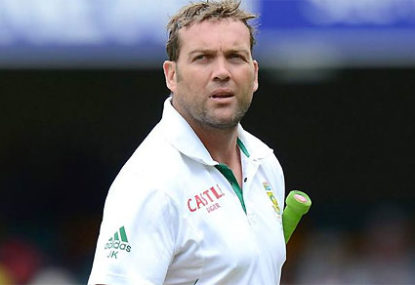As the Australian cricket team is all set to tour South Africa next month, I thought of selecting the best post-World War II Test XI from South Africa.
It proved more difficult than I thought. Usually statistics are my yardstick but it does not work for South Africa as some of their best Test cricketers played only few Tests due to the isolation of their country from 1970 to 1991.
For example, Barry Richards and Mike Procter played only eleven Tests between them.
Their Test averages are amazing. Richards averaged 72.57 with the bat in four Tests and Procter 15.02 with the ball in seven.
Had Richards played more Tests, who knows? He could have scored more runs than Sachin Tendulkar and Ricky Ponting at an average closer to Don Bradman’s and his namesake Viv Richards.
Procter could have taken more wickets at a better average than Muttiah Muralitharan and Shane Warne.
This is all speculative of course, but not beyond belief.
Also my hero, Graeme Pollock with a batting average of 60.97, may also get bypassed as a contender as he played only 23 Tests.
So I have changed my mind-set and will go by potential and not by figures alone, especially for those Proteas legends whose Test careers were cruelly aborted through no fault of theirs. Class over stats shall be my mantra.
With introduction and ifs and buts over, let me get on with my job of selecting a South African XI from those representing their country from 1947 onwards.
Who will open the batting?
There are five candidates; Barry Richards, Jackie McGlew, Kepler Wessels, Herschelle Gibbs and Graeme Smith.
McGlew was too slow, once batting for 545 minutes to score a century against Australia at Durban in 1957-58. He took a further 30 minutes to add five runs.
According to Wisden, his surname fitted his batting style; he stuck like glue!
Richards is a certainty but with whom will he open, Wessels, Gibbs or Smith? My choice is the current South African captain Graeme Smith.
How can I go past him, with 9220 runs at an average of almost 50 in 114 Tests and 27 centuries under his belt?
Hashim Amla will come in at no.3 having scored 5956 fluent runs at 51.34 and hit 20 centuries in 73 Tests with a highest score of 311 not out against England at The Oval in 2012.
He will be followed by Graeme Pollock, one of the most sublime batsmen I have watched. He had style, grace, elegance and a Test average of 60.97.
The supreme all-rounder Jacques Kallis will come in at no.5. Along with Garry Sobers he remains the most prolific all-rounder in Test annals; 13289 runs at 55.37 with 45 centuries and 292 wickets at 32.65 in 166 Tests.
No.6 is difficult as there are so many nominations; Eddie ‘Bunter’ Barlow, Gary Kirsten, Gibbs, Shaun Pollock, AB de Villiers?
Although stats is not my sole criterion, Kirsten amassed 7289 runs at 45.27 in 101 Tests, hitting 21 centuries and 34 fifties and taking 83 catches is impressive.
But Shaun Pollock is my man for the no.6 spot as he is an all-rounder. In 108 Tests he scored 3781 runs at 32.31, captured 421 wickets at 23.11 and accepted 72 catches. He also hit two centuries and took five wickets in an innings 16 times.
These stats are dynamic.
Who will keep wickets; John Waite, Denis Lindsay, Lee Irvine, Dave Richardson or Mark Boucher?
To me, it is Boucher by a mile as he holds most Test records as a wicket-keeper, having made 555 dismissals in 147 Tests. The next best is Australia’s Adam Gilchrist, way behind with 416 dismissals in 96.
Boucher will bat at no.7 as he scored 5515 runs at 30.30, registering five centuries and 35 fifties.
Now to the hardest part: to select three fast bowlers. Neil Adcock and Peter Heine formed a great pace partnership in 1950s. Adcock averaged a miserly 21.10 when grabbing 104 wickets in 26 Tests.
Mike Procter, considered among the greatest fast bowlers, was unlucky to play only seven Tests before his country was boycotted because of their Government’s apartheid policy.
But in those Tests he thundered his way to international fame by capturing 41 scalps at 15.02.
Other candidates are Peter Pollock (brother of Graeme and father of Shaun), Allan Donald and the current great Dale Steyn.
My choice for the three super quicks is Procter, Donald and Steyn.
They will be supported by all-rounders Kallis and Shaun Pollock to get reverse swing.
It’s easy to select a spinner. He is Hugh Tayfield. He was one of the greatest off-spinners the world has seen, having taken more wickets per Test (4.59; 170 wickets in 37 Tests) than even England’s Jim Laker and West Indian Lance Gibbs.
Against England at Durban in 1956-57, Tayfield bowled 137 consecutive balls without conceding a run, a world record.
He ended up with 8-69. A fortnight later in the same series at Johannesburg he took 13 wickets including 9-113 in the second innings.
South Africa has produced two outstanding fielders; Colin Bland and Jonty Rhodes. They will be my 12th and 13th men.
So here is my South Africa’s post 1947 Test XI in batting order:
Barry Richards, Graeme Smith, Hashim Amla, Graeme Pollock, Jacques Kallis, Shaun Pollock, Mark Boucher (WK), Mike Procter, Allan Donald, Dale Steyn and Hugh Tayfield.





























































































